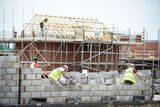Rent hikes as housing plan backfires and inflation rises
Minister said linking hikes to index would be good for tenants

Hundreds of thousands of tenants face further rent increases linked to soaring inflation after Housing Minister Darragh O’Brien’s policy backfired.
Mr O’Brien is coming under pressure to act just months after the moves he made to keep a lid on rapid rents were introduced.
Renters were promised changes introduced in the summer would lead to lower rent increases under his rent pressure zone legislation.
A change was made where annual rent rises are now based on inflation instead of set caps.
But since then, the inflation rate used to determine rents in rent pressure zones (RPZs) has shot up to 3pc.
Read more
Mr O’Brien said in July when he announced the change that the inflation rate being used to determine rates had averaged just 0.73pc over the past three years.
Around three-quarters of all tenancies are in areas designated as RPZs.
Before the new system was brought in, rents could only rise by 4pc a year.
When making the change Mr O’Brien said the 4pc had become a target rather than a limit.
Now rents in RPZs can only rise in line with the Harmonised Index of Consumer Prices (HICP) – a standardised measure of inflation used across the EU.
But the latest figures for the HICP show it rose to 3pc in August, a 13-year high.
This is despite Mr O’Brien promising the change would mean “significantly reducing the level of rent increases in RPZs”.
Rent costs have doubled in the last decade. They are almost 40pc above their pre-crisis levels in Dublin and 20pc up across the rest of the country.
Asked if the rise in the HICP would mean a rise of 3pc, a spokesperson for Mr O’Brien said: “If the last rent setting in an RPZ occurred in August 2020, a 3pc rent increase would be permissible.”
Sinn Féin housing spokesman Eoin Ó Broin said the new rent measures were failing, as he said they would when they were introduced. The inflation rate was heading for 4pc, he said.
He called for a three-year rent freeze and a rent credit for tenants. He claimed if rents had been linked to inflation years ago it would have stopped rental costs getting out of control.
Labour’s Ivana Bacik said her party wants a three-year rent freeze.
“For years, we wanted rents linked to inflation,” she said. “In the meantime rents have reached record levels due to multi-annual 4pc increases but just as the Government finally acts, the HICP rate of inflation starts to soar.”
The Dáil is due to debate a Labour Party bill on protecting renters and stronger protections from evictions today.
Economist at KBC Bank Austin Hughes said the change in determining how much landlords will be allowed to increase rents will not lead to lower rents any time soon.
“The likelihood is that inflation will rise further in coming months,” he said. “Depending on what happens to energy bills, it could threaten 4pc.”
He said although most economists expect inflation to ease back next year, it could remain relatively high for some time.
“This means the switch from the previous 4pc rental ceiling may not lead to markedly lower rental increases, in the near term at least.”
Mr Hughes said the switch to an inflation measure means permitted rent increases are going to be faster when the cost of living is rising rapidly
This will translate into a double whammy to the spending power of renters.
Economist with Davy Stockbrokers Colin Grant said the Government’s decision to move to the harmonised index was on the assumption that this would be considerably lower than 4pc.
“However, given the uptick in inflation, this objective has been compromised,” he said.
The most recent Daft.ie report showed average rents have risen by a further 5.6pc, which has been blamed on a record shortage of properties.
Read more
Join the Irish Independent WhatsApp channel
Stay up to date with all the latest news















